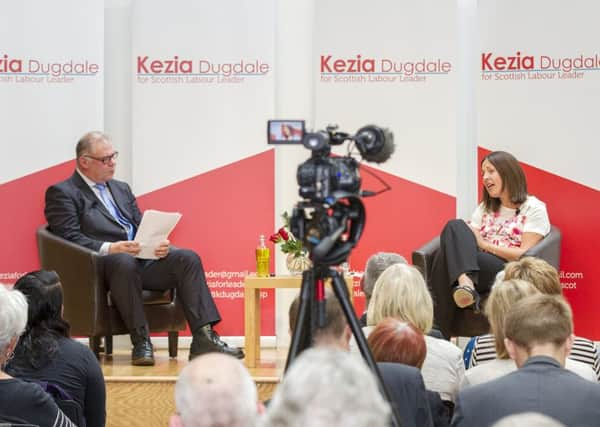Labour will ‘scrap tax breaks for private schools’


The Lothians MSP also pledged to increase taxes for Scotland’s high earners using the new powers coming to Holyrood, to address the gap between rich and poor in state schools – and held out an olive branch to the SNP.
Independent schools chiefs branded the charitable status move as “gesture politics” and warned the move could jeopardise the funded places of hundreds of poorer pupils.
Advertisement
Hide AdAdvertisement
Hide AdDugdale set out the “bold and radical” approach to education inequalities as she launched her campaign to replace Jim Murphy as Labour leader in Edinburgh yesterday.
The charitable status of independent schools gives them millions of pounds in tax breaks through an 80 per cent reduction in non-domestic rates – while state schools must pay the full amount.
“I would end charitable status for private schools,” Dugdale said.
She said that she believed very strongly that it is wrong that private schools get tax breaks “given the problems our schools face just now and the lack of resource that they have and they’re sat beside other schools, particularly in this city – 21 per cent of kids in Edinburgh go to private schools.
“I don’t criticise any parent who sends their kid to private school – at the end of the day they want the best for their children and you can’t criticise anyone for that.
“But they shouldn’t be at an advantage from the get-go. We have to ensure that every single child in Scotland can realise their potential and that is not happening just now. It’s a national scandal.”
The charitable status of private schools has been a contentious issue for years.
An eight-year inquiry by watchdog the Office of the Scottish Charity Regulator recently gave private schools the green light to keep the status after it came under threat over claims the schools were too exclusive.
Advertisement
Hide AdAdvertisement
Hide AdThe report confirmed that ten top schools meet key tests, having previously fallen short.
John Edward, of the Scottish Council of Independent Schools, said he was disappointed at Dugdale’s call and warned that the move would see schools scrapping scholarships for pupils from low income backgrounds.
He said: “She will be narrowing access to independent schools. The independent schools won’t shut, it won’t make any difference to how they operate. It is a purely symbolic gesture because our schools at a conservative estimate contribute £250 million in exchequer benefits never mind anything else.”
Edward said schools get rates relief in return for doing an “enormous amount of work” in return to meet the stringent charity tests set out by the last Labour government at Holyrood. There are about 600 to 700 pupils being funded by independent schools and thousands more on bursaries of 20-80 per cent.
He added there had been “zero consultation” on the issue from Dugdale. “She’s the only spokesperson of education who never agreed to a meeting with us in all the time she was in the job. I’m not conscious she’s ever set foot in an independent school so I don’t know how she knows about it.”
The value of the cut in non-domestic rates status – revenue which goes to councils – for private schools has previously been put at more than £10 million a year.
A Holyrood petition last year found the tax liability at Fettes, in Edinburgh, was cut from £209,139 to £41,828 in 2011. Gordonstoun boarding school in Moray – whose ex-pupils include Prince Charles – saw its tax liability reduced from £148,086 to £29,618 in the same year. And George Watson’s College, another fee-paying Edinburgh school, only had to pay £83,530 instead of the full liability of £412,649 – a taxpayer-funded subsidy of £329,119.
Dugdale rejected claims her stance on private schools was a case of “ideology over pragmatism” and that many private schools may scrap scholarships for poorer pupils without charitable status.
Advertisement
Hide AdAdvertisement
Hide Ad“That suggests that private schools only offer scholarships because they get a tax break,” she said. “If private schools are serious about giving kids from poorer backgrounds opportunity, they won’t need a tax cut to do that – they should be doing it anyway.”
Labour had pledged to raise the income tax rate to 50p for those earning more than £150,000 if the party won the general election in May. Dugdale said she would pursue this policy at Holyrood and the money would be used “specifically to close the attainment gap” in schools.
She said: “The thing that got me into politics was child poverty, but eight years into an SNP administration we still have a huge attainment gap in our schools and there’s been no attempt to close that.
“If we’re going to do that, if we’re going to be serious about it, we need to raise money to do it and target that resource. I’m going to ask those who earn more to pay more and target that resource.
“I believe in taxing the rich a bit more to invest in public services and to target that resource at the people who need it most. And for me the starting place for that has got to be our education system.”
Dugdale added: “I’ve heard [finance minister] John Swinney talking about the new powers that are coming and the SNP talking about how they might be interested in the new tax powers. I think that’s a conversation we need to have as a country. If the SNP are up for, I’m up for it.”